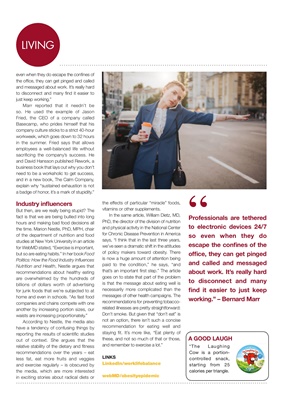
LIVINGLIVING
even when they do escape the confines of
the office, they can get pinged and called
and messaged about work. It's really hard
to disconnect and many find it easier to
just keep working."
Marr reported that it needn't be
so. He used the example of Jason
Fried, the CEO of a company called
Basecamp, who prides himself that his
company culture sticks to a strict 40-hour
workweek, which goes down to 32 hours
in the summer. Fried says that allows
employees a well-balanced life without
sacrificing the company's success. He
and David Hansson published Rework, a
business book that lays out why you don't
need to be a workaholic to get success,
and in a new book, The Calm Company,
explain why "sustained exhaustion is not
a badge of honor, it's a mark of stupidity."
Industry influencers
But then, are we really being stupid? The
fact is that we are being bullied into long
hours and making bad food decisions all
the time. Marion Nestle, PhD, MPH, chair
of the department of nutrition and food
studies at New York University in an article
for WebMD stated, "Exercise is important,
but so are eating habits." In her book Food
Politics: How the Food Industry Influences
Nutrition and Health, Nestle argues that
recommendations about healthy eating
are overwhelmed by the hundreds of
billions of dollars worth of advertising
for junk foods that we're subjected to at
home and even in schools. "As fast food
companies and chains compete with one
another by increasing portion sizes, our
waists are increasing proportionately."
According to Nestle, the media also
have a tendency of confusing things by
reporting the results of scientific studies
out of context. She argues that the
relative stability of the dietary and fitness
recommendations over the years - eat
less fat, eat more fruits and veggies
and exercise regularly - is obscured by
the media, which are more interested
in exciting stories about radical diets or
*The Laughing
Cow is a portioncontrolled
snack,
starting from 25
calories per triangle.
A GOOD LAUGH
the effects of particular "miracle" foods,
vitamins or other supplements.
In the same article, William Dietz, MD,
PhD, the director of the division of nutrition
and physical activity in the National Center
for Chronic Disease Prevention in America
says, "I think that in the last three years,
we've seen a dramatic shift in the attitudes
of policy makers toward obesity. There
is now a huge amount of attention being
paid to the condition," he says, "and
that's an important first step." The article
goes on to state that part of the problem
is that the message about eating well is
necessarily more complicated than the
messages of other health campaigns. The
recommendations for preventing tobaccorelated
illnesses are pretty straightforward:
Don't smoke. But given that "don't eat" is
not an option, there isn't such a concise
recommendation for eating well and
staying fit. It's more like, "Eat plenty of
these, and not so much of that or those,
and remember to exercise a lot."
LINKS
LinkedIn/worklifebalance
webMD/obesityepidemic
Professionals are tethered
to electronic devices 24/7
so even when they do
escape the confines of the
office, they can get pinged
and called and messaged
about work. It's really hard
to disconnect and many
find it easier to just keep
working." - Bernard Marr
"